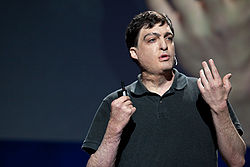- Dan Ariely
-
Dan Ariely 
Dan Ariely speaking at TED, 2009Born April 29, 1968 Nationality Israeli American Institution Duke University
Massachusetts Institute of TechnologyField Behavioral economics Alma mater Duke University
University of North Carolina
Tel Aviv UniversityDan Ariely (born April 29, 1968) is an Israeli American professor of psychology and behavioral economics.[1] He teaches at Duke University and is the founder of The Center for Advanced Hindsight.[2]
Contents
Biography
Ariely was born in New York while his father was studying for an MBA degree at Columbia University, and he grew up in Ramat Gan and Ramat Hasharon, Israel. His mother was a parole officer. When in his senior year of high school he was active in the Hanoar Haoved Vehalomed youth movement, and while preparing "fire signs" (a common feature in ceremonies of youth movements in Israel) he suffered third-degree burns over 70 percent of his body from an accidental magnesium flare explosion.
Ariely was a physics and mathematics major at Tel Aviv University, but transferred to philosophy when he found the writing too physically taxing. He also holds an M.A. and Ph.D. in cognitive psychology from the University of North Carolina at Chapel Hill, and a Ph.D. in business from Duke University.
After obtaining his PhD degrees he taught at MIT between 1998 and 2008, before returning to Duke University as James B. Duke Professor of Psychology and Behavioral Economics. Apart from his prolific academic writing, he published two popular books, one titled Predictably Irrational, and the other titled The Upside of Irrationality, both of which became New York Times best sellers.[citation needed]
Ariely is married and has two children.
Academic career
He was formerly the Alfred P. Sloan Professor of Behavioral Economics at MIT Sloan School of Management. Although he is a professor of marketing with no formal training in economics, he is considered one of the leading behavioral economists. Ariely is the author of the books Predictably Irrational: The Hidden Forces That Shape Our Decisions and placebo), Ariely responded that there could be a short term cost, but that there would also likely be long-term benefits, and that reading his book would not make a person worse off.[3]
Research
A 2011 study (Norton & Ariely, 2011) claims that Americans are united in their vision of what the ideal[clarification needed] wealth distribution would be, which follows in the same trend as the research on shared misinformation on the actual wealth distribution by John Bates Clark Medal winner and MacArthur Fellow, Emmanuel Saez.[citation needed]

The study, which polled a cross section of U.S. residents, claimed that the average U.S. resident prefers a wealth distribution in which the top 20% owned between 30% and 40% of the privately held wealth, which is substantially different from the 85% that the top 20% actually own. They also found the average survey participant preferred the bottom 40%--that's 120 million Americans—-to have 25%-30% of the wealth, not the mere 8% to 10% their the average participant thought this group had, and far above the 4% they actually had.
The wealth distribution selected as "ideal" by the average participant is close to the actual 2011 income distribution in Sweden, as noted by Ariely and colleagues. However, one notable discrepancy is that the income distribution rather than the wealth distribution of Sweden was used as a reference point. In wealth distribution, Sweden is quite similar to the U.S. [4] [5]
Publications
- Books
- Ariely, Dan (2008), Predictably Irrational: The Hidden Forces That Shape Our Decisions, HarperCollins, pp. 304, ISBN 9780061353239
- Ariely, Dan (2010), The Upside of Irrationality, HarperCollins, pp. 352, ISBN 9780061995033
- Articles
- Ariely, Dan; Zauberman, Gal (2000), "On the making of an experience: The effects of breaking and combining experiences on their overall evaluation", Journal of Behavioral Decision Making 13: 219–232, doi:10.1002/(SICI)1099-0771(200004/06)13:2<219::AID-BDM331>3.0.CO;2-P, http://web.mit.edu/ariely/www/MIT/Papers/expseg.pdf
- Combining experiences over time: the effects of duration, intensity changes and on-line measurements on retrospective pain evaluations
- Coherent Arbitrariness: Stable demand curves without stable preferences
- Ariely, Dan (2000), "Controlling information flow: Effects on consumers' decision making and preference", Journal of Consumer Research 27 (2): 233–248, doi:10.1086/314322, http://www.journals.uchicago.edu/cgi-bin/resolve?id=doi:10.1086/314322
- Ariely, Dan; Wertenbroch, Klaus (2002), "Procrastination, Deadlines, and Performance: Self-Control by Precommitment", Psychological Science 13 (3): 219–224, doi:10.1111/1467-9280.00441, PMID 12009041, http://web.mit.edu/ariely/www/MIT/Papers/deadlines.pdf
- Heyman, James; Ariely, Dan (2004), "Effort for Payment: A Tale of Two markets", Psychological Science 15 (11): 787–793(7), doi:10.1111/j.0956-7976.2004.00757.x, PMID 15482452, http://web.mit.edu/ariely/www/MIT/Papers/2markets.pdf
- Tom Sawyer and the Construction of Value
- Placebo Effects of Marketing Actions: Consumers May Get What They Pay For
- Dishonesty in Everyday Life and Its Policy Implications
- Try it, you'll like it: The influence of expectation, consumption, and revelation on preferences for beer
See also
References
- ^ Dan Ariely. NNDB.
- ^ Dan Ariely | The Center
- ^ "Predictably Irrational Is an Irresistible Look at Our Not-So-Rational Foibles" Derek Tokaz, The Commentator, Feb. 28, 2008,
- ^ Swedish inequality datapoint of the day
- ^ [Norton, M. I., & Ariely, D. Building a Better America—One Wealth Quintile at a Time Perspectives on Psychological Science January 2011 6: 9-12]
External links
Categories:- 1968 births
- Living people
- American economists
- Behavioral economists
- Israeli economists
- Duke University alumni
- Duke University faculty
- Massachusetts Institute of Technology faculty
- MIT Sloan School of Management faculty
- Tel Aviv University alumni
- University of North Carolina at Chapel Hill alumni
- Ig Nobel Prize winners
Wikimedia Foundation. 2010.
